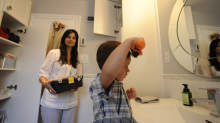University Hospital Zurich
Raemistrasse 100 Zurich, Zurich (Switzerland)
German Hospital Service
Destouchesstr. 1 Munchen, Bayern (Germany)
Moorfields Eye Hospital NHS Trust
162 City Road London, Greater London (UK)
Flinders Medical Centre
Flinders Drive, Bedford Park South Australia (Australia)
How do you protect your children from household poisons

Selina Esteves thought that she knew everything when it came to protecting her children from danger
The Toronto mother works at the Hospital for Sick Children and is constantly surrounded by messages about the importance of safety
But she received a major jolt about four months ago when her toddler drank two bottles of liquid medication when he should have been in bed sleeping While Ms Esteves was downstairs helping her older son with homework Hudson 3 got out of bed went to the bathroom and dragged a stool to the medicine cabinet He found two bottles of liquid childrens medication removed the childresistant caps and drank the contents of both
After a frantic call to 911 and a trip to the hospital it turned out that Hudson would be okay But the ordeal was a terrifying wakeup call Ms Esteves said
Even the most vigilant parents probably do not realize the hidden hazards in their homes I thought I was being really careful and that I had done what I should be doing Ms Esteves said If somebody like me can screw up then other parents are not doing their due diligence in ensuring their children are safe
Her warning comes as a survey reveals that the majority of Canadian parents are making mistakes that could put their children in similarly dangerous situations The survey conducted on behalf of Safe Kids Canada a national advocacy organization found that while nearly all parents say its important to lock up medications and household cleaners many arent following through
About half of parents say they store medication in a medicine cabinet while 60 per cent keep cleaning products under the sink
The findings are surprising because of the very real risk of children ingesting potentially toxic medications or cleaning products in addition to other common household items said Margaret Thompson medical director of the Ontario Poison Centre If its available a child will get into it she said
But one of the biggest mistakes parents make may come as a surprise referring to medication as candy Many childrens medications are designed to have a pleasing taste but Dr Thompson said its a major error to refer to them as candy as it could unwittingly entice children
Parents must educate their children that even if medication tastes good its only to help them feel better and that they should not have any more than what they are given
At the same time many parents assume that if all else fails childresistant caps will keep their children from ingesting prescription and nonprescription drugs
Ms Estevess story proves that this isnt the case Her son was able to open two bottles of medication with childresistant caps
Dr Thompson has also heard of cases in which children have bitten the bottoms off containers with childresistant caps
And because children are naturally curious they are likely to try to ingest items that make little sense to an adult such as windshieldwasher fluid antifreeze or perfume which are often made with alcohol Dr Thompson has even heard of children eating an entire tube of toothpaste
I think parents overestimate the ability of those childresistant caps to keep their kid out of the medication said Pamela Fuselli executive director of Safe Kids Canada Theyre not childproof theyre childresistant
There are no national statistics documenting how many children are poisoned each year That is part of the problem Its difficult to quantify the true extent of the problem and to determine where prevention efforts should be aimed Ms Fuselli said
The most common poisonings are linked to medication and household cleaners
But Ms Fuselli also highlighted another deadly substance carbon monoxide Everyone is at risk from this colourless odourless gas and its important to install carbonmonoxide detectors on each floor of the house she said
Safe Kids Canada compiled information from poisoncontrol centres across the country and determined that seven children die each year and nearly 1700 are admitted to hospital as a result of poisonings
Theres still a lot of work to do Ms Fuselli said
So what can parents do
Keep all medications and vitamins in a locked container and make sure it and the key are out of the sight of children
Put household cleaners and other items including detergent windshieldwasher fluid nailpolish remover and pesticides in locked cupboards or bins or use a childsafety latch
Ensure that medications are kept in their original containers as the product information will be needed in case of ingestion by a child
Dont refer to medication as candy
Call the poisoncontrol centre if you think your child may have ingested a potentially hazardous substance
Date : 29 May, 2012
Reference : www.theglobeandmail.com/life/health/new-health/health-news/how-do-you-protect-your-children-f
